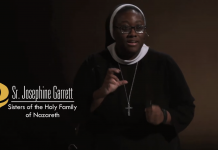
Praise, Repent, Ask, and You
CLAIRE MCGARRY
What should I pray for?” my six-year-old daughter, Jocelyn, leaned over and asked as we knelt down in the pew before Mass. Her question made me realize that for the past two years, while her cousin, Olivia, had been undergoing leukemia treatments, Jocelyn had been praying for her constantly. Now that Olivia was considered cancer-free, Jocelyn was confused about what to pray for next. “Thank God for all he’s done for Olivia,” I whispered back as a quick response. Yet the exchange helped me see that I needed to give my daughter a more well-rounded lesson on how to pray.
Later that day, there seemed no better place to start than with Matthew 6:9-13, the words Jesus used when teaching his followers to pray. To help my daughter, and all children, better understand why Jesus chose the words he did in what is now called the Our Father, I broke the main elements of the prayer into the acronym PRAY.
P = Praise
“Hallowed be your name …” (Matthew 6:9)
Jesus doesn’t instruct us to praise God because God is some egomaniac up in heaven who needs to be flattered with compliments in order to love and bless us. Praising God is actually about helping us recognize just how gracious God is.
As we reflect on all the wonders God does in the world, counting our own blessings as we do, our hearts swell with gratitude. Jesus knew that a thankful heart always draws us closer to God.
R = Repent
“Forgive us our debts, as we forgive our debtors …” (Matthew 6:12)
If we hold on to our mistakes and those of others, it does to our soul what rust does to a bicycle: It slowly eats away at what brings us joy. When the mistake is ours, we tend to move away from God in our embarrassment. When the mistake is another’s, we tend to move away from the one who hurt us. Both scenarios leave us isolated from grace.
It’s only when we admit our sins to God and seek forgiveness that we’re washed clean, inspiring us to move back into the circle of his love. When we grant forgiveness to another, we mirror the same mercy God extends to us.
A = Ask
“Give us today day our daily bread …” (Matthew 6:11)
Unfortunately, most of us consider God like a genie in a lamp: If we pray a certain way, God will grant our every wish. Yet, there isn’t a single part of the Our Father that says, “Give me everything I ask for and give it to me now!” Instead, Jesus teaches us to prioritize the things we “need” over the things we “want.” God will always provide us with what is truly necessary. Our job is to trust his promise to do so.
That being said, God is still a God of lavish blessings. It brings Him great joy to shower us with far more than what we need, but only when it’s for our good. Therefore, we can ask for anything. God knows what is best for us and will always answer our prayers accordingly.
Y = You (Make yourself an action verb)
“Your kingdom come, your will be done …” (Matthew 6:10)
If all we did was take, none of us would have friends for very long. Not only would we be extremely selfish people, but we’d miss out on the joy that comes from giving to others. The same holds true with our relationship with God. If all we do is ask, and only take from him, we’ll never experience the blessing of being called by him.
No matter our age, we all have the ability to create good in this world. Before ending our prayer time, we should listen for God’s promptings for how we are to serve. Whether it’s being kinder to our neighbor or resolving to visit the elderly, we can take action to fulfill Matthew 6:10 by helping to create God’s kingdom “on earth as it is in heaven.”
Classroom activities
1. Using cut-up phrases of the Our Father on paper or cardstock, ask your students to place them under the applicable letters of PRAY.
2. Fill a bowl with slips of paper with four prewritten examples of each of the elements of PRAY. As you draw out and read each one, the students can decide which letter it applies to.
3. Create a classroom prayer by writing the group’s responses to PRAY.
CLAIRE MCGARRY is the author of Bayard’s Lenten devotional With Our Savior. Her freelance work has appeared in several Chicken Soup for the Soul books, Focus on the Family magazine, and various devotionals. A regular contributor to CatholicMom.com, she posts weekly on her own blog, ShiftingMyPerspective.com.
PHOTOS: NO-TE EKSARUNCHAI/SHUTTERSTOCK
This article was originally published in Catechist, February 2020.




